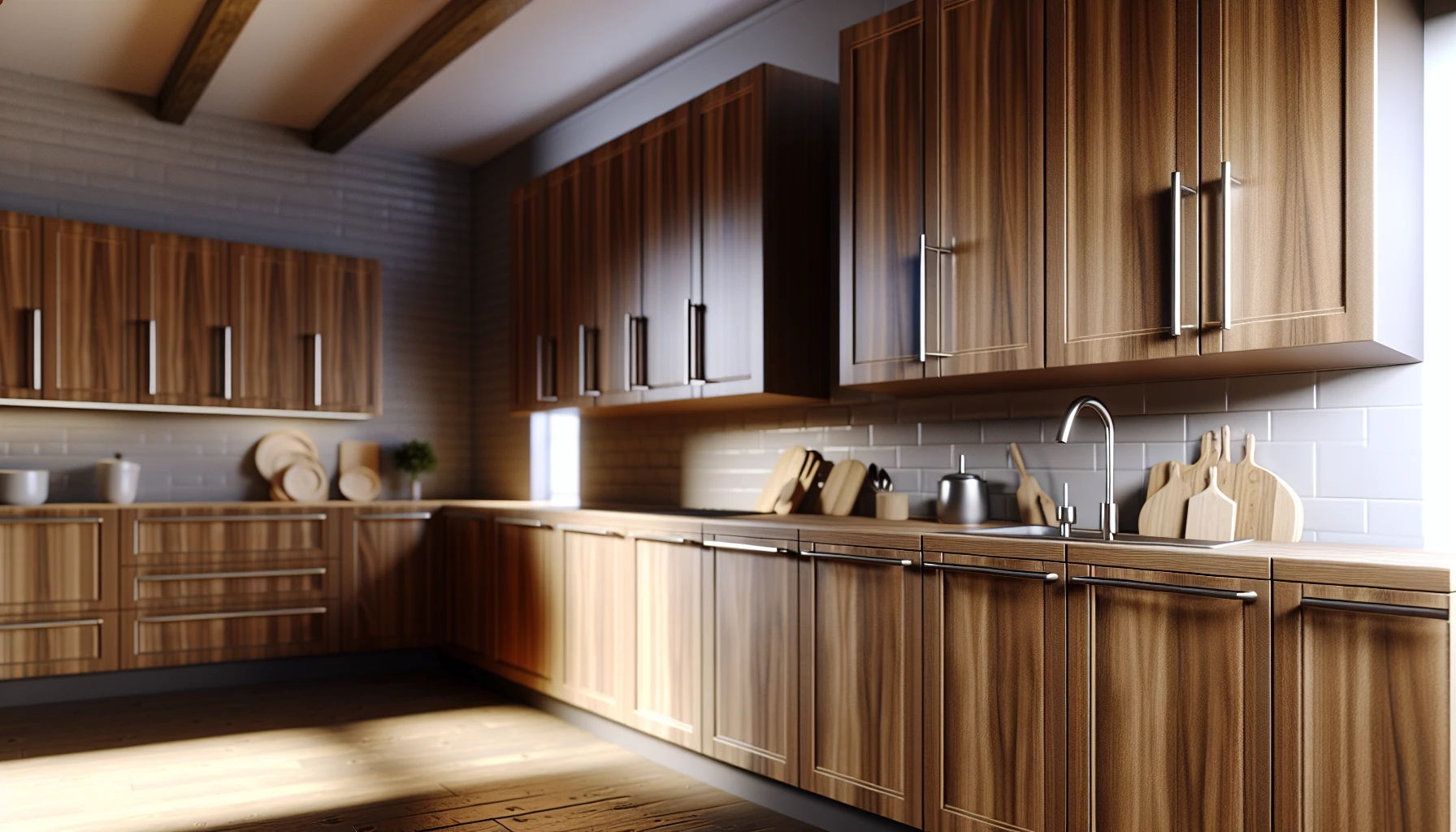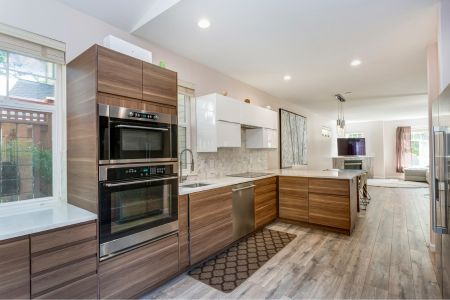In this blog post, we will explore the different aspects influencing the average cost to remodel a kitchen and provide valuable insights to help you budget smarter for your dream kitchen.
Key Points
- Understanding the average cost of kitchen remodels requires an assessment of size, scope, materials, labor, and budgeting.
- Careful consideration is essential for a successful remodel to balance quality and affordability.
- With thoughtful planning, it is possible to save money by undertaking DIY projects and making prudent purchases.
Understanding the Average Cost of Kitchen Remodels

The average cost of kitchen remodels depends on factors such as:
- Size
- Scope
- Materials
- Labor
The average kitchen remodel cost can range from $10,000 to over $130,000, making it essential to consider the kitchen remodel costs when planning your project. Your kitchen remodel budget should ideally comprise 15% to 20% of your home’s value.
Understanding the key factors contributing to a kitchen remodel’s overall price can help clarify the costs.
Size and Scope of Remodel
The size and scope of your remodel play a significant role in determining the overall cost. Here are some estimated costs for different kitchen remodel dimensions:
- More minor remodel (70 square feet): $7,000 – $17,500
- More extensive remodel (200 square feet): $20,000 – $50,000
- Large-scale remodel (involving demolition and alterations to the structural footprint): $70,000 – $130,000 or higher
For DIY enthusiasts, cosmetic enhancements like installing new cabinet hardware, wallpaper, and light fixtures can be completed independently, potentially saving money on labor costs.
Material Choices
Material choices can significantly impact the cost of a kitchen remodel. Here are some factors to consider:
- High-end materials, such as custom cabinetry and marble countertops, will increase prices.
- Budget-friendly options like laminate countertops and refacing existing cabinets can help decrease costs.
- Kitchen cabinetry is the most expensive component of a remodel, contributing significantly to overall costs.
- Consider the expense of any custom cuts and shapes when considering countertops.
You are maintaining a balance between quality and affordability, which aids in making wise material choices and staying within your budget.
Labor Costs
Labor costs account for a significant portion of the overall budget, typically constituting at least 15%+ of the total cost for an average kitchen remodel. Professional services like hiring a general contractor are often more expensive than DIY efforts.
The labor cost can be influenced by whether the project is DIY or requires hiring a contractor, with contractor rates ranging between 10% to 20% of the project cost. Considering labor costs while planning your kitchen remodel is beneficial, as decisions can be made based on your skill set and budget.
Breaking Down the Kitchen Remodel Budget
Understanding the key factors influencing a kitchen remodel’s cost allows for a detailed budget breakdown into specific categories. A typical kitchen remodel budget consists of:
- Cabinetry
- Countertops
- Appliances
- Flooring
Each category has its range of costs, which can help you better allocate your funds and make informed decisions when planning your kitchen renovation.
Cabinetry

Cabinetry costs can vary greatly depending on the type and quality of cabinets chosen. Here are some cost-effective options for remodeling kitchen cabinets:
- Replace just the doors
- Reface the cabinets
- Refinish the cabinets
- Paint the cabinets
The average cost to remodel kitchen cabinets is estimated to be between $4,500 and $15,000 when replacing them.
Evaluating the benefits of custom cabinetry versus the lesser cost of stock or refaced cabinets aids in deciding the best choice for your kitchen remodel.
Countertops

Countertop costs depend on the material chosen, with options like laminate being budget-friendly and materials like marble being more expensive. The average cost range to install countertops is between $1,870 and $4,370. Laminate countertops are the most cost-effective option, while marble is the most expensive.
When selecting a countertop material, consider the average cost of custom cuts and shapes and the overall aesthetics and durability of the material to help remodel the kitchen.
Appliances
Appliance costs can range from budget-friendly to high-end, with energy-efficient options potentially offering long-term savings. Remember to include the price of a new kitchen sink and its installation in your kitchen remodel budget.
To save money on appliances, consider reusing existing appliances or look for bundle deals that offer discounts on multiple devices purchased together.
Flooring
Flooring costs depend on the material chosen, with options like linoleum being more affordable and materials like hardwood or tile being more expensive. Linoleum and vinyl flooring are cost-effective options for a kitchen remodel, costing between $3 and $12 per square foot. On the other hand, hardwood flooring can cost between $6 and $18 per square foot, while tile flooring costs can range from $2 to $100 per square foot.
When selecting flooring materials, consider durability, maintenance, and overall aesthetics.
Saving Money on Your Kitchen Remodel
Careful planning and smart choices can save money on your kitchen remodel. Some effective strategies to cut costs include undertaking DIY projects, smart shopping for materials and appliances, and prioritizing upgrades that offer the most value.
Each of these cost-saving strategies warrants a more detailed examination.
DIY Projects
DIY projects can help reduce labor costs but should be limited to tasks within the homeowner’s skill set to avoid costly mistakes. Painting walls, installing new appliances, and applying the backsplash are examples of DIY tasks that can save money on labor costs. However, recognizing your limitations and employing professionals for jobs requiring specialized skills or permits, like plumbing, electrical work, and gas line installation, is essential.
Smart Shopping
Smart shopping involves comparing prices, looking for deals, and choosing budget-friendly materials. Research and compare prices from various suppliers, look for discounts or promotions on materials and consider the overall value of the materials for your kitchen remodel.
Also, consider appliance bundle deals that provide discounts on multiple appliances purchased together to save money on your kitchen remodel.
Prioritizing Upgrades

Prioritizing upgrades that offer the most value can help maximize the return on investment. Some high-value upgrades for a kitchen renovation include:
- Energy-efficient appliances
- Functional improvements
- Smart storage solutions
- Specialty appliances
- Kitchen islands
- New cabinets
- Multi-functional kitchen islands
You can create a more functional and attractive kitchen space by focusing on these upgrades.
Concentrating on the most impactful upgrades ensures your kitchen remodel enhances your home’s aesthetics, functionality, and value.
Hiring Professionals for Your Kitchen Remodel
Hiring professionals for a complete kitchen remodel is often necessary for tasks that require specialized skills or permits, such as plumbing, electrical work, and gas line installation. The success of your kitchen remodeling project hinges on finding the right contractor who will oversee the kitchen remodeling project, manage subcontractors, and arrange material orders and deliveries.
The following discussion will cover when to hire professionals and how to find the right contractor for your kitchen remodel.
When to Hire Professionals
Professionals should be hired for tasks such as:
- Plumbing
- Electrical work
- Gas line installation
- Projects that require permits
While DIY projects can save money on labor costs, they may not be suitable for tasks that require specialized skills or knowledge, and mistakes can lead to costly repairs or even damage to your home.
Knowing your limitations and involving professionals for tasks beyond your skill set is essential.
Finding a Contractor

Finding a contractor involves several steps:
- Research and compare options
- Check for certifications and reviews
- Obtain multiple quotes to ensure a fair price.
- Seek referrals from your circle
- Utilize online platforms such as Angi and Renofi
- Examine organizations like the Chamber of Commerce and the Better Business Bureau
Following these steps, you can find a reliable and trustworthy contractor for your project.
When selecting a contractor, query their experience, association with subcontractors, and whether warranties and insurance accompany their work. Investing time to find the right contractor guarantees a successful kitchen remodel that aligns with your expectations and budget.
Assessing the Return on Investment (ROI)
A kitchen remodel’s return on investment (ROI) can be assessed through increased home value, energy savings, and improved functionality and aesthetics. A well-executed kitchen remodel can transform your home and offer financial gains.
The following discussion will cover evaluating the ROI of your kitchen remodel considering these factors.
Home Value Increase
A well-executed kitchen remodel can increase a home’s value, with an average ROI of 50-70%. Some kitchen upgrades that offer the most beneficial return on investment include:
- Upgrading to modern appliances
- Adding a kitchen island
- Updating or replacing cabinets
- Replacing countertops
Concentrating on high-value upgrades ensures your kitchen remodel enhances your home’s aesthetics and overall value.
Energy Savings
Energy-efficient appliances and materials can lead to long-term savings on utility bills. Newer refrigerators, microwaves, and other devices with energy-efficient labels demonstrate reduced electricity consumption compared to older models.
Prioritizing energy efficiency in your kitchen remodel decreases energy bills and increases home value.
Improved Functionality and Aesthetics
Improved functionality and aesthetics can enhance the homeowner’s enjoyment of the space and make the kitchen more appealing to potential buyers. Some examples of functional improvements that can increase home value include:
- Smart storage solutions
- Specialty appliances
- Kitchen islands
- New cabinets
- Multi-functional kitchen islands
Concentrating on the most impactful upgrades ensures your kitchen remodel enhances your home’s aesthetics, functionality, and value.
Summary
In conclusion, a kitchen remodel can be a rewarding investment, transforming your home and potentially increasing its value. By understanding the factors that affect the cost, breaking down your budget into categories, saving money through DIY projects and intelligent shopping, hiring professionals when needed, and assessing the return on investment, you can make informed decisions and create the kitchen of your dreams. With careful planning and execution, your kitchen remodel can enhance your home and your life.
Frequently Asked Questions
A realistic budget for a kitchen remodel ranges from $14,607 to $40,616, depending on the style and finish of the cabinets chosen.
Given a home valued at $300,000, it is advisable to spend no more than $30,000-$45,000 on a kitchen remodel, which suggests that $30,000 is not enough for a complete renovation.
It is possible to do a kitchen remodel for $10,000, but this amount will likely cover only essential upgrades. Mid-range upgrades requiring more design elements and custom cabinetry could easily reach up to $20,000.
Cabinetry is usually the most expensive part of a kitchen remodel, with an average cost of $8,200 and representing up to 40% of the overall budget.
The typical cost range for an average kitchen remodel is between $14,607 and $40,616.




